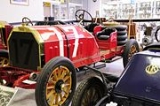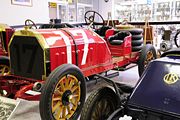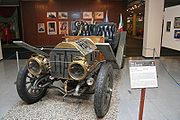
Itala
Encyclopedia
Itala was a car manufacturer based in Turin
, Italy from 1904-1934, started by Matteo Ceirano
and five partners in 1903.


 Three cars were offered in the first year, an 18hp, a 24hp and a 50hp. In 1905 they started making very large engined racing cars with a 14.8 Litre 5 cylinder model which won the Coppa Florio
Three cars were offered in the first year, an 18hp, a 24hp and a 50hp. In 1905 they started making very large engined racing cars with a 14.8 Litre 5 cylinder model which won the Coppa Florio
and the year after that the Targa Florio
. In 1907 a 7433 cc 35/45hp model driven by Count Scipione Borghese won the Peking to Paris
motor race by three weeks. These sporting successes helped sales dramatically, the company continued to grow. The company experimented with a range of novel engines such as variable stroke, sleeve valve
, and "Avalve" rotary types and at the beginning of World War I, offered a wide range of cars. During the war Itala built aeroplane engines but made a loss producing them.
After the armistice car production resumed with models based on the pre war cars such as the Tipo 50 25/35hp and a re-appearance of the Avalve in the 4426 cc Tipo 55 but financial success eluded the company
From 1924 the company was being run under receivership and they appointed Giulio Cesare Cappa from Fiat
as general manager. He produced a new car, the Tipo 61 with 7 cylinder alloy engine which was well received but he then decided to return to motor sport producing the Tipo 11 a very advanced car with front wheel drive, V-12 supercharged engine and all round independent suspension but the car never raced. Two Tipo 61s did take part in the 1928 Le Mans 24 hour race
winning the 2 litre class.
The company was bought by truck maker Officine Metallurgiche di Tortona
in 1929 and a few more cars were made up to 1935. The remains of the company was sold to Fiat.
. Each valve fed a pair of cylinders and was mounted alongside, rotating parallel to them. Four ports cast into the valve alternately connected ports to the cylinders through the side of the valve to the inlet and exhaust manifolds at bottom and top of the valves.
began his career as a racing mechanic working on these rotary valve engines for the driver Giulio Foresti. He met Malcolm Campbell
, when in 1923, Campbell took over the Itala and Ballot
concessions in London. Seeing the publicity potential of racing them at Brooklands
, Campbell also bought two of Foresti's race-prepared cars. Foresti and Villa delivered them in person from Paris to Campbell's house at Povey Cross. Impressed by Campbell's wealth and ambitions, Villa accepted an offer to become his permanent mechanic.
Turin
Turin is a city and major business and cultural centre in northern Italy, capital of the Piedmont region, located mainly on the left bank of the Po River and surrounded by the Alpine arch. The population of the city proper is 909,193 while the population of the urban area is estimated by Eurostat...
, Italy from 1904-1934, started by Matteo Ceirano
Matteo Ceirano
Matteo Ceirano was an Italian businessman in the early automobile industry.His father, Giovanni Battista Ceirano, was an automobile pioneer, and with his brothers Ernesto Ceirano and Giovanni Ceirano, Matteo worked in his father's automobile workshop. With Giovanni, he created the Ceirano Matteo &...
and five partners in 1903.
Cars



Coppa Florio
Coppa Florio was an Italian car race started in 1900, and renamed in 1905 when Vincenzo Florio offered the initial 50 000 Lira and a cup designed by Polak of Paris. The cup was to be offered the manufacturer that wins four or more of the first seven races, the first race held in 1905...
and the year after that the Targa Florio
Targa Florio
The Targa Florio was an open road endurance automobile race held in the mountains of Sicily near Palermo. Founded in 1906, it was the oldest sports car racing event, part of the World Sportscar Championship between 1955 and 1973...
. In 1907 a 7433 cc 35/45hp model driven by Count Scipione Borghese won the Peking to Paris
Peking to Paris
The Peking to Paris motor race was a race held in 1907 for automobiles between Peking , China and Paris, France, a distance of 9,317 miles or 14,994 km....
motor race by three weeks. These sporting successes helped sales dramatically, the company continued to grow. The company experimented with a range of novel engines such as variable stroke, sleeve valve
Sleeve valve
The sleeve valve is a type of valve mechanism for piston engines, distinct from the usual poppet valve. Sleeve-valve engines saw use in a number of pre-World War II luxury cars and in USA in the Willys-Knight car and light truck...
, and "Avalve" rotary types and at the beginning of World War I, offered a wide range of cars. During the war Itala built aeroplane engines but made a loss producing them.
After the armistice car production resumed with models based on the pre war cars such as the Tipo 50 25/35hp and a re-appearance of the Avalve in the 4426 cc Tipo 55 but financial success eluded the company
From 1924 the company was being run under receivership and they appointed Giulio Cesare Cappa from Fiat
Fiat
FIAT, an acronym for Fabbrica Italiana Automobili Torino , is an Italian automobile manufacturer, engine manufacturer, financial, and industrial group based in Turin in the Italian region of Piedmont. Fiat was founded in 1899 by a group of investors including Giovanni Agnelli...
as general manager. He produced a new car, the Tipo 61 with 7 cylinder alloy engine which was well received but he then decided to return to motor sport producing the Tipo 11 a very advanced car with front wheel drive, V-12 supercharged engine and all round independent suspension but the car never raced. Two Tipo 61s did take part in the 1928 Le Mans 24 hour race
24 Hours of Le Mans
The 24 Hours of Le Mans is the world's oldest sports car race in endurance racing, held annually since near the town of Le Mans, France. Commonly known as the Grand Prix of Endurance and Efficiency, race teams have to balance speed against the cars' ability to run for 24 hours without sustaining...
winning the 2 litre class.
The company was bought by truck maker Officine Metallurgiche di Tortona
Tortona
Tortona is a comune of Piemonte, in the Province of Alessandria, Italy. Tortona is sited on the right bank of the Scrivia between the plain of Marengo and the foothills of the Ligurian Apennines.-History:...
in 1929 and a few more cars were made up to 1935. The remains of the company was sold to Fiat.
Itala rotary valves
A distinctive feature of the pre-World War I 50hp & 90hp models was their use of a rotary valveRotary valve
A rotary valve is a type of valve in which the rotation of a passage or passages in a transverse plug regulates the flow of liquid or gas through the attached pipes. The common stopcock is the simplest form of rotary valve...
. Each valve fed a pair of cylinders and was mounted alongside, rotating parallel to them. Four ports cast into the valve alternately connected ports to the cylinders through the side of the valve to the inlet and exhaust manifolds at bottom and top of the valves.
Leo Villa
Leo VillaLeo Villa
Period 3D photographs taken by Leo Villa on a Stereo Realist camera given to him by Donald Campbell.- References :...
began his career as a racing mechanic working on these rotary valve engines for the driver Giulio Foresti. He met Malcolm Campbell
Malcolm Campbell
Sir Malcolm Campbell was an English racing motorist and motoring journalist. He gained the world speed record on land and on water at various times during the 1920s and 1930s using vehicles called Blue Bird...
, when in 1923, Campbell took over the Itala and Ballot
Ballot (automobile)
Ballot was a French automobile manufacturer who made cars between 1921 and 1932.The Ballot brothers, Edouard and Maurice, founded their company in 1905. Before World War I they manufactured automobile and marine engines. The company was re-founded as Etablissements Ballot SA in 1910.Edouard...
concessions in London. Seeing the publicity potential of racing them at Brooklands
Brooklands
Brooklands was a motor racing circuit and aerodrome built near Weybridge in Surrey, England. It opened in 1907, and was the world's first purpose-built motorsport venue, as well as one of Britain's first airfields...
, Campbell also bought two of Foresti's race-prepared cars. Foresti and Villa delivered them in person from Paris to Campbell's house at Povey Cross. Impressed by Campbell's wealth and ambitions, Villa accepted an offer to become his permanent mechanic.

